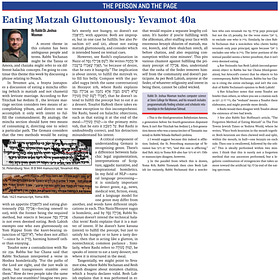Embarrassment and Homily
A point raised by the maggid shiur on today’s daf, Bava Kamma 91— which was all about paying for boshet, and whether one is allowed to embarrass (oneself, others) — is what about the fact that malbin pnei chaveiro berabbim is a yeihareig va’al yaavor, and ein lo chelek le’olam haba? If so, that should interact with various aspects of the sugya, yet it doesn’t.
Without getting into the intricacies of how it might or might not impact the sugya, I would argue that those other sugyot were not actually meant as strict halacha, or even if as halacha, are not meant to be taken literally. If there is an issue of bechor bemi’ut hara, taking the minimally evil path, I am not convinced that embarrassing someone would actually arise to the level of ain lo chelek or yeihareig va’al yaavor. If I could either eat pork or kill someone, eat pork or commit adultery, eat pork or worship an idol, I should eat the pork. I understand that draining the blood from someone’s face by embarrassing them is a way of “shedding blood”, and so is like killing them, as one source says, but that is poetic, and homiletic. It isn’t literal. I don’t really know where embarrassing should be placed in the various levels.
This isn’t my own idea, I think. Here is the Rambam, Hilchot Teshuva, about embarrassing someone, and other sins for which one loses his share in the World to Come:
יד1 כָּל אֶחָד וְאֶחָד מֵאַרְבָּעָה וְעֶשְׂרִים אֲנָשִׁים אֵלּוּ שֶׁמָּנִינוּ - אַף עַל פִּי שֶׁהֵן יִשְׂרָאֵל, אֵין לָהֶם חֵלֶק לָעוֹלָם הַבָּא. וְיֵשׁ עֲבֵרוֹת קַלּוֹת מֵאֵלּוּ, וְאַף עַל פִּי כֵן אָמְרוּ חֲכָמִים שֶׁהָרָגִיל בָּהֶן אֵין לוֹ חֵלֶק לָעוֹלָם הַבָּא•, כְּדֵי•* לְהִתְרַחֵק מֵהֶן וּלְהִזָּהֵר מֵהֶן.
יד וְאֵלּוּ הֵן: הַמְּכַנֶּה אֶת חֲבֵרוֹ•, וְהַקּוֹרֵא לַחֲבֵרוֹ בְּכִנּוּיוֹ•, וְהַמַּלְבִּין פְּנֵי חֲבֵרוֹ• בָּרַבִּים, וְהַמִּתְכַּבֵּד בִּקְלוֹן חֲבֵרוֹ•, וְהַמְּבַזֶּה תַּלְמִידֵי חֲכָמִים, וְהַמְּבַזֶּה רַבּוֹתָיו, וְהַמְּבַזֶּה אֶת הַמּוֹעֲדוֹת•, וְהַמְּחַלֵּל אֶת הַקֳּדָשִׁים•.
There’s a variant text of what I bolded, which has the extra word הן. And the vowels aren’t present. Therefore it is either kedei, in order. Or keday hein, they are (therefore fitting). Of that list is הַמַּלְבִּין פְּנֵי חֲבֵרוֹ בָּרַבִּים, one who embarrasses his friend in public.
I believe the first reading is correct. The sentence in (1) would therefore be:
And there are sins which are less than these (enumerated above, for which a Jew lost his share in the World-to come). And even so, the Sages said that one who is accustomed to practicing them has no share in the World to Come — in order to distance himself from them and to beware of them.
In other words, Chazal lied. Or rather, exaggerated. Or spoke non-literally, I would say. These sins are actually not genuinely that bad. (And indeed, there’s a difference between doing it once and generally acting in this manner.) However, by overstating the penalty, they will cause people to distance from such natural behavior. “In order to”
The second possible reading is:
And there are sins which are less than these (enumerated above, for which a Jew lost his share in the World-to come). And even so, the Sages said that one who is accustomed to practicing them has no share in the World to Come. It is (therefore) fitting to distance oneself from them and to beware of them.
The former seems more plausible to me, and to flow more smoothly.
I’ve written about this topic in the past, that Chazal sometimes are speaking homiletically rather than literal-halachically. And that an important middah shehaTorah nidreshet bahen, hermeneutical tool to interpret texts, is to recognize genre, so that you don’t take the wrong things literally.
Here are a few examples:
Berachot #1: Not Literally Stealing
So YU has begun masechet Berachot. I’ve seen that some shiurim are actually starting at first perek. On YUTorah, they posted on behalf of Rav Schachter a fascinating document — a scan of which masechtot / perakim YU has historically covered for the past some-odd years.
Gluttonous Eating
In Nazir 23a, Rabbi Yochanan discusses one eating the korban Pesach gluttonously. אָמַר רַבָּה בַּר בַּר חָנָה אָמַר רַבִּי יוֹחָנָן: מַאי דִּכְתִיב ״כִּי יְשָׁרִים דַּרְכֵי ה׳ וְצַדִּקִים יֵלְכוּ בָם וּפֹשְׁעִים יִכָּשְׁלוּ בָם״ — מָשָׁל לִשְׁנֵי בְּנֵי אָדָם שֶׁצָּלוּ אֶת פִּסְחֵיהֶן, אֶחָד אֲכָלוֹ לְשׁוּם מִצְוָה, וְאֶחָד אֲכָלוֹ לְשׁוּם אֲכִילָה גַּס…
Suff Noogies
On Shabbos, I learn maseches Megilla with a chabura, and so I’ve once again encountered this gemara, so that is a good enough reason to write this, about the halachic legitimacy of the Ashkenazic pronunciation for tefillah and krias haTorah. There are folks out there, people or movements, who criticize Ashkenazic pronunciation, legitimately pointing out …




